Blog
April 4th, 2009
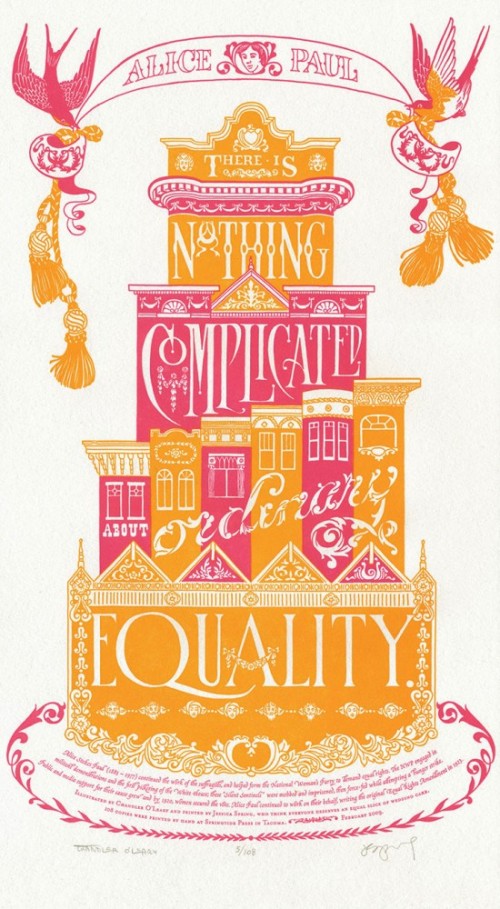
Jessica Spring and I have been having a high ol’ time with our Dead Feminists series thus far, celebrating positive changes happening around the country with the first two prints we created. At the same time, we were shocked and dismayed to learn that Proposition 8 had passed in California. Now, I know that people are extremely divided on this issue, so in the interest of respecting others I’ll try not to open any worm-cans here (this is an art blog, not a soap box). But we wanted to express our thoughts on the matter, so Prop Cake was born. The quote we chose made the issue seem like…well, a piece of cake:
There is nothing complicated about ordinary equality. —Alice Paul
The initial idea for this piece came almost immediately; Jessica looked over at me on a drive home from Seattle one day and said, “How about a big, pink wedding cake?” I grinned from ear to ear, and started sketching as soon as I got home. The design didn’t come together so easily, however. Everything I came up with looked more like an ad for Modern Bride than a political poster. Frustrated, I pushed my sketches aside and took a few days off to think.
And then I went to San Francisco.
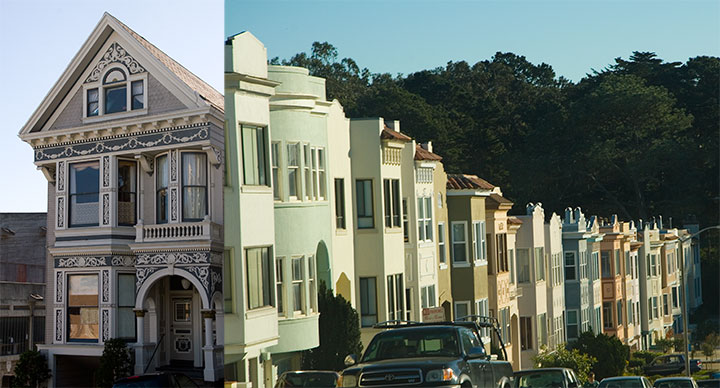
It was my first trip there, and my first thought as I passed through the residential neighborhoods, with rows and rows of candy-colored stucco houses, was “Wow, these things look like big frosted cakes!” And the lightbulb turned on, at last. I spent three days walking, driving, and riding around the neighborhoods, camera and sketchbook in hand. I made pages and pages of notes on architectural detailing.
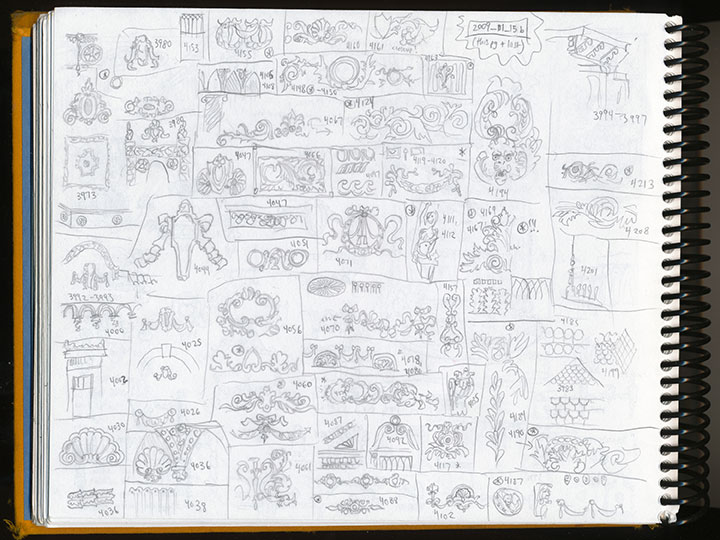
When I arrived home, I got right to work. This time, finally, it all came together.
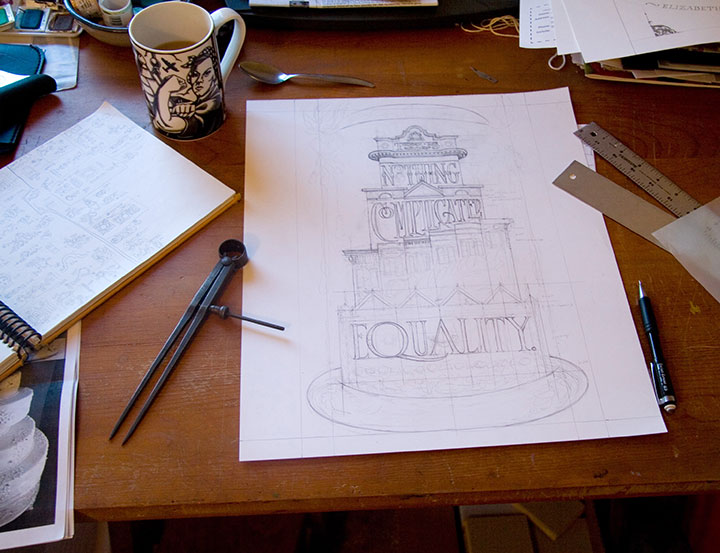
Alice was right—it really was a piece of cake.
• • • • • • • • • • • • • • • • • • • • • • • • • • • • • • • • • • • • • • • • • • • • • • • • • • • • • • • • • • • •
Prop Cake: No. 3 in the Dead Feminists series
Edition size: 108
Poster size: 10 x 18 inches
Printed on an antique Vandercook Universal One press, on archival, 100% rag (cotton) paper. Each piece is numbered and signed by both artists.
Colophon reads:
Alice Stokes Paul (1885 – 1977) continued the work of the suffragists, and helped form the National Woman’s Party to demand equal rights. The NWP engaged in militant demonstrations and the first picketing of the White House; these “Silent Sentinels” were mobbed and imprisoned, then force-fed while attempting a hunger strike. Public and media support for their cause grew and by 1920, women secured the vote. Alice Paul continued to work on their behalf, writing the original Equal Rights Amendment in 1923.
UPDATE: poster is sold out. Reproduction postcards available in the Dead Feminists shop!
April 3rd, 2009
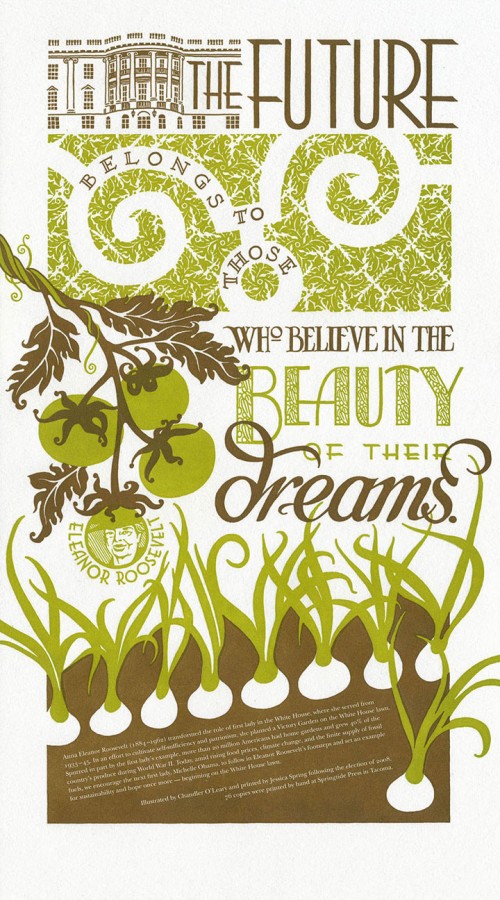
With the success of our first piece, Jessica and I wanted to continue our Dead Feminists series with something that upped the ante a bit. And to our complete shock, we were rewarded by our second broadside selling out in just 48 hours (thanks to the magic of the internets!). Our next subject was one that we both had been thinking about for some time: personal sustainability. As the Tailor and I are both hard-core seasonal foodies (more on this topic will probably come out eventually), and as Jessica is a member of a local crop share, we’d like to see a change in the American food system. So we turned to one of our favorite feminists: Eleanor Roosevelt.
The future belongs to those who believe in the beauty of their dreams.
While serving as First Lady, Roosevelt planted a White House victory garden during World War II; thanks to her inspiration and example, during the War home gardens accounted for 40% of the U.S. supply of vegetable produce. We thought, hey, if it could be done once, why not again? So the colophon at the bottom included a plea for the new First Lady, Michelle Obama, to carry on in Roosevelt’s footsteps.

My inspiration for the design of Victory Garden came from a variety of sources. For one thing, the typography is inspired by the Art Deco designs of Roosevelt’s era. For another, I thought back to my honeymoon in France last year.

I spent a day at Versailles on that trip, and at the time was struck by the meticulous aesthetic that unified every element of the place. Everything from the wallpaper to the upholstery to the grounds themselves worked together to form a cohesive overall design. An overly ornate and despicably ostentatious design, sure (and a bit ironic, considering Marie Antoinette’s consequences for going overboard with luxury in the face of a starving populace), but it was beautiful in its own right. I especially loved the sculpted hedges and lawns of the Versailles gardens; the patterns form a stunning, living brocade at one’s feet. And I wanted to turn that design sense into something that represented the greater good, rather than the wealth of the few. So I abstracted that idea into a two-dimensional White House lawn, made up with an original brocade pattern of spiraling leaves.
When we finally arrived at the finished product, we were happily surprised to learn that many others had had similar thoughts. We discovered Michael Pollan’s editorials; learned about the “Eat the View” movement; and found many other like-minded folk along the way—including one who purchased a copy of Victory Garden for her friend, a direct descendant of Eleanor Roosevelt herself. As the icing on the cake, one of our Chicago customers had a personal connection to the Obamas, and promised to deliver a copy of the broadside to the First Lady, with our compliments. We have no idea if it actually reached her in the end, but there’s always hope. And besides, we’re taking a bit of personal pride in being part of a larger movement, as well as the fact that the new White House garden is already happening.
Victory garden, indeed.
• • • • • • • • • • • • • • • • • • • • • • • • • • • • • • • • • • • • • • • • • • • • • • • • • • • • • • • • • • • •
Victory Garden: No. 2 in the Dead Feminists series
Edition size: 76
Poster size: 10 x 18 inches
Printed on an antique Vandercook Universal One press, on archival, 100% rag (cotton) paper. Each piece is numbered and signed by both artists.
Colophon reads:
Anna Eleanor Roosevelt (1884 – 1962) transformed the role of first lady in the White House, where she served from 1933-1945. In an effort to cultivate self-sufficiency and patriotism, she planted a Victory Garden on the White House lawn. Spurred in part by the first lady’s example, more than 20 million Americans had home gardens and grew 40% of the country’s produce during World War II. Today, amid rising food prices, climate change, and the finite supply of fossil fuels, we encourage the next first lady, Michelle Obama, to follow in Eleanor Roosevelt’s footsteps and set an example for sustainability and hope once more—beginning on the White House lawn.
Poster is sold out. Reproduction postcards available in the Dead Feminists shop!
April 2nd, 2009
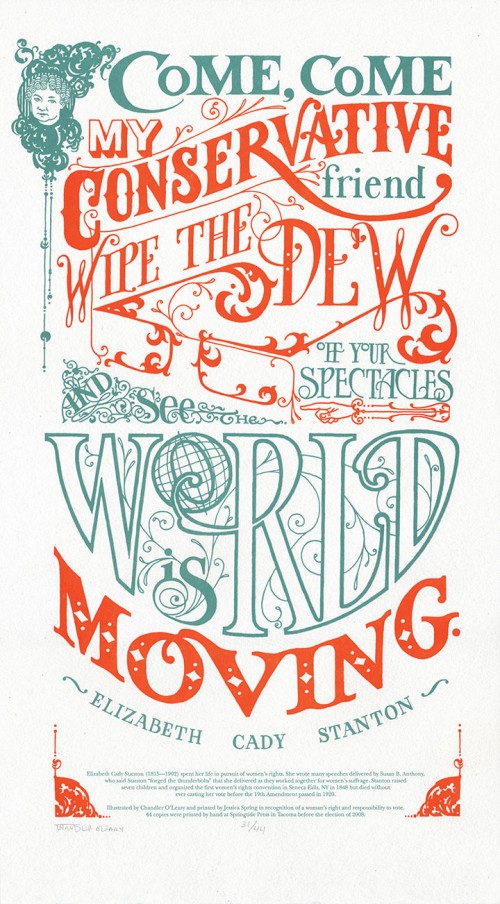
This blog might be brand new, but I should probably bring you up to speed on a project that isn’t. Starting last fall, right before the 2008 Presidential Election, my friend and fellow letterpress printer Jessica Spring asked me if I wanted to collaborate on a political broadside (basically, a letterpress version of a poster) together. We both felt like this was an important event, and a moment in history, and we wanted to make some sort of contribution to the artistic record. Jessica said she had a historical quote that would be fun to typeset, and asked if I could do a quick illustration of a pair of spectacles to go with it. She thought it’d be fun to make the glasses look like the famous eyewear of a certain Alaskan VP candidate (who can see Russia from her house!)—her plan was to use her impressive collection of wood and metal type to hand-set the quote into the design.
Well, she probably shouldn’t have left me alone with my pencils, because I got a little carried away, and drew not just the glasses, but the whole quote around them, too:
Come, come my conservative friend, wipe the dew off your spectacles and see the world is moving. — Elizabeth Cady Stanton
I did this because I wanted the piece to be something more than simply a jab at a political personality. I wanted it to be beautiful in its own right, something that might do justice to Stanton’s words, and that would be longer-lasting than a momentary visual pun. Besides, Stanton put up one of the most important fights in American history: women’s suffrage. In this country with with a voter turnout rate of less than two-thirds, I wanted to do my small part to get women everywhere, regardless of political stripe, to the polls. And then, as it always does, my fingers started itching to draw my own letterforms. After all, for as much as I love hand-setting type, one of the reasons I’m a letterer is because I’m continually frustrated by the finite number of typefaces available in wood and metal. Not that I’m happy with choosing among the thousands and thousands of digital font families out there, either. Let’s just say I’m picky. So I made up my mind to letter the whole thing by hand, and not to tell Jessica until the sketch was done.
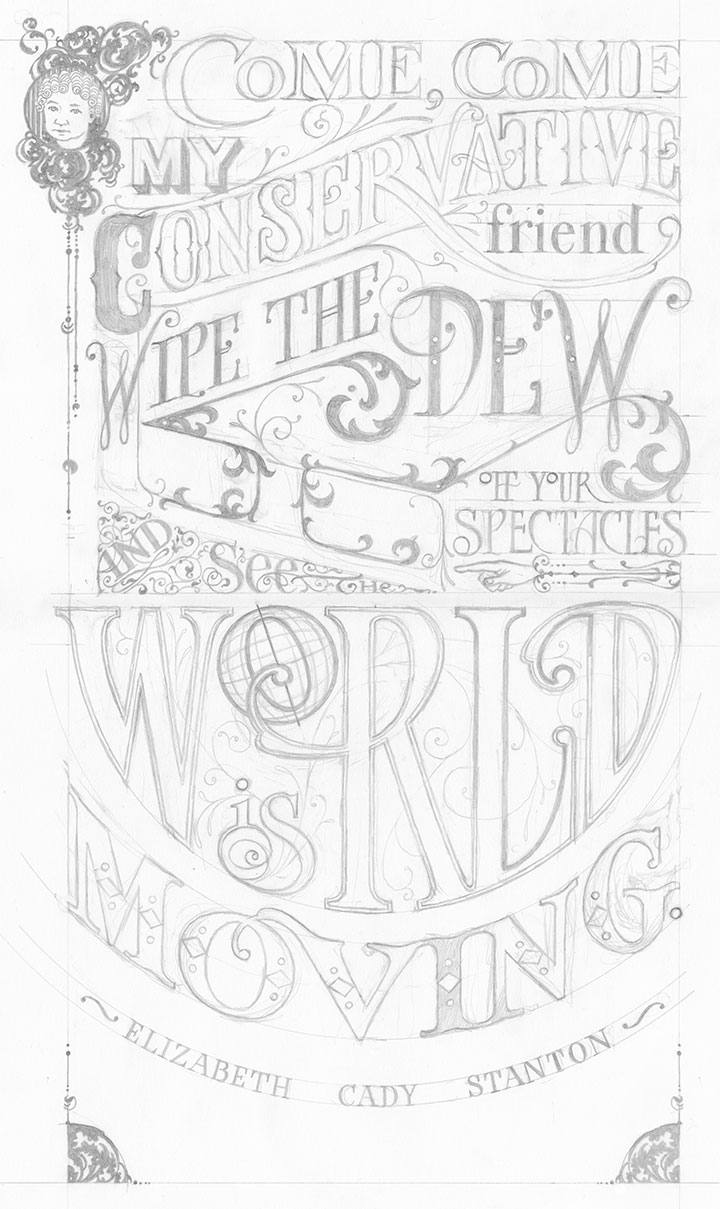
Bless her heart, she went along with the idea. We scrapped the idea of setting vintage type and printed the image using a modern material called photopolymer plates (more on that another day). And then we put the broadside into our online shop, and sent out an email to our little mailing list to let them know we’d made something new.
Three days later, the entire edition of prints was sold out. We were floored! Neither of us had ever experienced this kind of clamoring for our work before—we’d both sold out editions before, but not this quickly. People started emailing us and asking if we were going to do more posters. After reading that, we kind of looked at each other and said, “Why not?”
And the Dead Feminists series was born.
(More on the series another day: first, let’s get to the details about the broadside itself:)
• • • • • • • • • • • • • • • • • • • • • • • • • • • • • • • • • • • • • • • • • • • • • • • • • • • • • • • • • • • •
Come, Come: No. 1 in the Dead Feminists series
Edition size: 44 prints
Poster size: 10 x 18 inches
Printed on an antique Vandercook Universal One press, on archival, 100% rag (cotton) paper. Each piece is numbered and signed by both artists.
Colophon reads:
Elizabeth Cady Stanton (1815 – 1902) spent her life in pursuit of women’s rights. She wrote many speeches delivered by Susan B. Anthony, who said Stanton “forged the thunderbolts” that she delivered as they worked together for women’s suffrage. Stanton raised seven children and organized the first women’s rights convention in Seneca Falls, NY in 1848 but died without ever casting her vote before the 19th Amendment passed in 1920.
Poster is sold out. Reproduction postcards available in the Dead Feminists shop!
April 1st, 2009
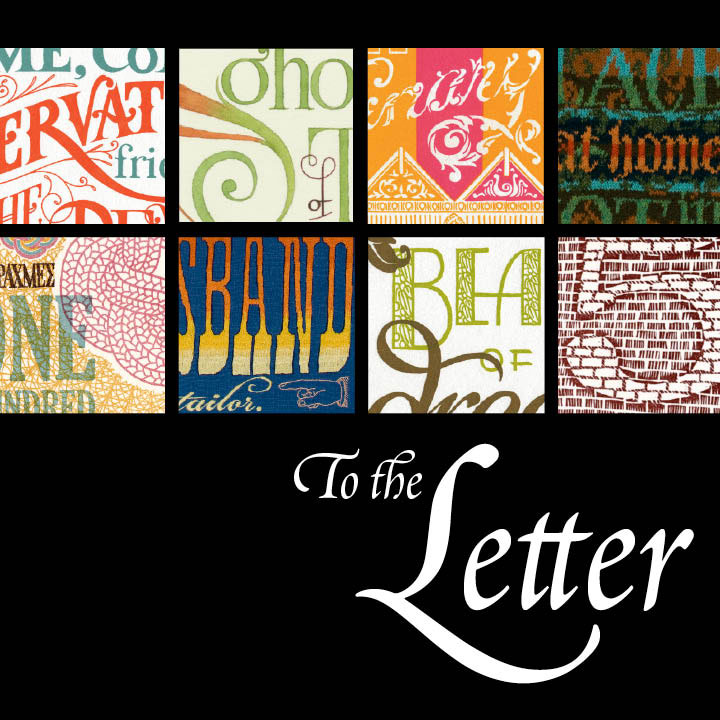
Well, the threads are tied, everything is installed, and I’ve scanned for typos at least six dozen times. I think we’re ready.
Tomorrow evening is the opening reception for To the Letter, my debut solo show. On view are a wide variety of pieces revolving around the art of the letterform: letterpress prints, textile typography, the Feminist Broadside series, artist books, sketchbooks, and more. Stop by and say howdy!
To the Letter: Works by Chandler O’Leary
April 1-30, 2009
Collins Memorial Library, University of Puget Sound
Opening reception:
Thursday, April 2, 4:30-7:00 p.m.
Since handwork is another theme of the show (hand-lettering, hand-binding, hand-stitching, etc.), some of my process materials are also on display. Weirdly, this detail is the part I’m most excited about—I’m forever encouraging my students to include sketches, supplies and other behind-the-scenes objects in their gallery shows, but this is the first chance I’ve had to do it myself. My process tends to be particularly convoluted (probably a symptom of O.C.D. or something), so I’m hoping the sight of things like tabletop platen presses and double-pointed knitting needles will spark some interesting conversation.
Speaking of which, Jessica Spring and I are doing a double-header on Sunday. I’ll be giving a guided tour of the exhibit, and Jessica will give a lecture on her newest artist book, Parts Unknown. There’ll be plenty to talk about, so come and pick our brains!
Sunday, April 5, 2009
Collins Memorial Library
1:00-1:45 p.m. To the Letter gallery talk with Chandler O’Leary
2:00-3:00 p.m. Parts Unknown presentation with Jessica Spring
Now, if you’ll excuse me, I think I’d better go check for typos one more time.

![Chandler O'Leary [logo]](https://chandleroleary.com/wp-content/themes/chandleroleary/images/logo.png)








